- Home
- News & Features
- Press Releases
- FY2022
- One Year After the Tonga Volcanic Disaster
Press Releases
February 3, 2023
One Year After the Tonga Volcanic Disaster
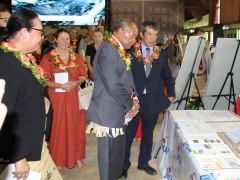 Minister of Foreign Affairs 'Utoikamanu (left), Acting Prime Minister Vaipulu (center), and Ambassador Munenaga (right) at the Japan booth in the exhibition hall.
Minister of Foreign Affairs 'Utoikamanu (left), Acting Prime Minister Vaipulu (center), and Ambassador Munenaga (right) at the Japan booth in the exhibition hall. 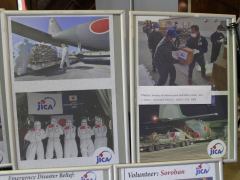 Photo exhibits of emergency relief supplies
Photo exhibits of emergency relief supplies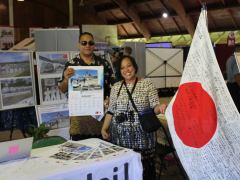 Japan booth
Japan booth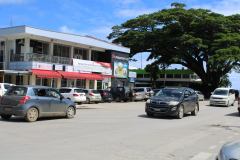 City of Nuku’alofa (present day)
City of Nuku’alofa (present day)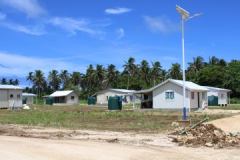 Resettlement village and housing complex for displaced people from Atata Island
Resettlement village and housing complex for displaced people from Atata Island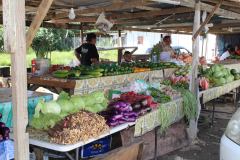 Resumption of vegetable production and sales
Resumption of vegetable production and sales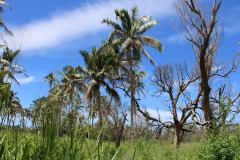 Trees destroyed by the tsunami
Trees destroyed by the tsunami
One year has passed since the Hunga Tonga-Hunga Ha'apai volcanic disaster on January 15 last year. A commemorative ceremony and exhibition were held at the invitation of the government at Nuku’alofa, the capital of Tonga, on January 13 and 14.
The ceremony was held on the 13th, attended by a large number of people including senior officials of the Tongan government and related organizations, diplomats, and the representatives from international organizations, the local private sector, and NPOs etc., with Acting Prime Minister Hon. Samiu Vaipulu (Minister of Justice) as the guest of honor. When offering his greeting, he reflected on the damage caused by the eruption and tsunami as well as recovery efforts by the government, the private sector, and the public in the year that has followed. Occasionally choking back tears, he expressed his gratitude for the support received from foreign governments, citizens, and international organizations, including Japan. Foreign Minister Fekitamoeloa 'Utoikamanu also made a speech referring to the details of the damage caused by the volcanic eruption and tsunami and of the reconstruction efforts that have been made by the Tongan government. She noted that the generous support from the partner countries and their citizens, international organizations, citizen groups, and others encouraged the people of Tonga to continue working towards reconstruction.
Reconstruction-related exhibits were displayed at the exhibition venue by the ministries, agencies, and related organizations that have worked hard toward the post-disaster recovery. Support providers, such as governments and international organizations, exhibited panels that illustrated their activities.
At the Japan booth, the Embassy of Japan and JICA Tonga Office jointly displayed exhibits. These included photos of the emergency relief provisions delivered by the Air Self-Defense Force transport aircraft and the Maritime Self-Defense Force transport ship “Osumi.” Also among the exhibits were messages written on a Japanese flag sent by the Self-Defense Forces and 1,000 paper cranes to wish for the country’s quick recovery. JICA exhibited materials concerning technical studies that the agency is promoting towards “Building Back Better (BBB),” while a video work, “Cheer for Tonga! (Popoaki fakalotolahi ki Tonga!),” was also shown at the exhibition hall with the permission of the producers. The video, which was originally published on social media, was produced mainly by former Japan Overseas Cooperation Volunteers (JOCV) who had operated in Tonga before the disaster, with the help of many other Japanese supporters of Tonga.
After the ceremony, many people, including Acting Prime Minister Vaipulu, Foreign Minister 'Utoikamanu, and Ambassador Munenaga, visited the Japan booth, which helped them to deepen their understanding of Japan’s support.
A year has passed since the disaster, and Nuku’alofa is restoring its calmness. In the city, the volcanic ash is no longer visible, and the washed-up rocks from the seawall and have been removed and the broken concrete embankments along Nuku’alofa’s coast have been repaired with temporary patches. Operations of the city’s water and electricity supply have been resumed, as has the use of rainwater from tanks stationed at each house. Agricultural production, being heavily damaged by the disaster, is also gradually returning to normal. In late February last year, one and a half months after the disaster, the submarine cables for international communication that were once cut were repaired. As a result, previously severed communications were restored. The repair work for the submarine cables for domestic communications has been delayed, but is expected to be completed in April or May of this year.
On the other hand, the recovery works are yet to begin for the residents of remote islands and coastal areas who were directly affected and lost their homes due to the tsunami. At the end of last year, a resettlement village and housing complex were finally completed for the displaced people of Atata and Mango Islands. As a result, the relocation of people who had temporarily moved into churches, community halls, and relatives' homes on Tongatapu Island has just begun. Housing and community support like this will continue going forward, but employment at the relocation site remains an issue. While fishermen whose boats were swept away by the tsunami are being offered alternative boats by the government and private sector, only a portion of these fishermen has received such assistance so far.
The tsunami also caused damage to the public infrastructure of the islands of Tongatapu, Eua, and Ha’apai, but the recovery of these islands is still only halfway completed. The government is gradually moving forward with the restoration of damaged seawalls, boat slips, roads, and public service facilities with support from overseas. However, funds are limited, so not all projects will be covered. The government is working towards developing disaster-resistant facilities, but further support from overseas is indispensable.
Furthermore, tourist facilities at the seaside and on the remote islands that were heavily hit by the disaster are still in a state of rubble, and recovery by the owners may take time. Post-disaster livelihood support and the promotion of the country's industries, including agriculture and fisheries, are therefore another urgent challenge.
JICA continues to support the reconstruction of Tonga.
- About JICA
- News & Features
- Countries & Regions
- Our Work
- Thematic Issues
- Types of Assistance
- Partnerships with Other Development Partners
- Climate Change / Environmental and Social Considerations
- Evaluations
- Compliance and Anti-corruption
- Science and Technology Cooperation on Global Issues
- Research
- JICA Development Studies Program / JICA Chair
- Support for the Acceptance of Foreign HRs / Multicultural and Inclusive Community
- Publications
- Investor Relations





